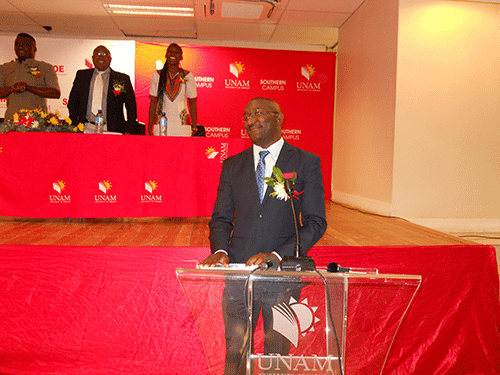KEETMANSHOOP – The University of Namibia’s pro-vice chancellor for academic affairs, Frednard Gideon, says globalisation, the impact of Covid-19, and the embracement of the fourth industrial revolution will make change inevitable for future education.
He gave this warning to educators at the official opening ceremony of the Unam School of Education’s annual conference (Educon), which is underway in Keetmanshoop.
“This conference aligns very well with the university’s strategic areas of focus and strategic objectives, particularly to ‘Improve Research and Innovation” he said.
Gideon added that today’s teacher education landscape is characterised by unprecedented and disruptive forces which lead to changes whose scope, speed and impact have never been seen before. In terms of the effects of Covid-19 on education, he reasoned that many aspects of teacher education momentarily came to a halt because of the pandemic.
“To mitigate the disruptive force of Covid-19, we had to re-strategise and re-plan,” he observed.
Gideon said in the same vein, the lack of e-preparedness in terms of e-skills and attitudes became more prominent as the teaching fraternity re-strategised and moved on to e-learning.
“Due to the unprecedented changes in communication and information technologies, the world is battling with the increasing disappearance of the divide between machines and human beings,” he said.
These developments, leading to the fourth and fifth industrial revolutions, have caused disruptive changes on the teacher education landscape nationally and internationally.
“The future classroom under the dispensation of these industrial revolutions requires a different type of teacher, one who can adapt and function effectively in a world that is increasingly shared with highly intelligent machinery,” he informed the audience.
The professor furthermore said “no longer are we training and producing teachers for the immediate and local supply. Instead, we have seen a phenomenon where teacher education has increasingly become globalised and teachers are being trained for the global marketplace,” he noted.
Gideon thus advised educators to find ways in embedding skills such as problem-solving, teamwork, digital literacy and global citizenship, amongst others, in the process of reimagining teacher and teaching education. With all these changes being experienced, the quality of teacher education programmes can thus never go unchallenged.
In her remarks, Unam southern campus director Lischen Haoses-Gorases said the conference’s theme, ‘Re-Imaging Education: A Discourse on Resilience, Adaptability, Inclusivity and Quality’, includes restoring what was lost as well as reducing and implementing new innovations. “Higher institutions of education in Namibia and neighbouring South Africa should be less on the receiving end, and become bold enough to do their own research and share it accordingly,” she emphasised. Through research, one will therefore be able to discover his/her own needs and work on them, instead of relying on others to inform their needs.
– sklukowski@nepc.com.na



